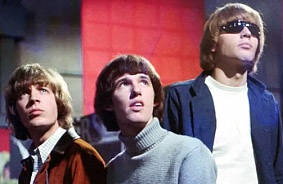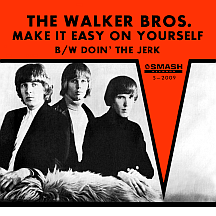THE WALKER BROTHERS
Make it Easy on Yourself
For the first ten years of what passed for a career in the entertainment business, Hamilton, Ohio-born Noel Scott Engel appeared on Broadway, recorded a dozen singles and came up pretty much empty-handed with each attempt. The young actor-singer achieved success only after a certain group from Liverpool, England found worldwide fame in 1964. Soon afterwards, an unlikely career path developed: having already established himself in Los Angeles, he formed a band with two others under a misleading pseudonym, then moved to the U.K. to compete directly with said superstars The Beatles, fortuitously convincing many fans along the way that he and his bandmates were native Englanders.
Broadway kid made a bid for the bigtime: His family moved to New York in the early 1950s and at age 12, as Scotty Engel, he had a small role in a Broadway musical, Plain and Fancy, starting in January 1955. Another part, in Richard Rodgers and Oscar Hammertein II's Pipe Dream (which received nine Tony award nominations), kept him busy through June '56. It seemed an easy transition into music and in early 1957 the 14-year-old made a record for the RKO Unique label, "When is a Boy a Man?," a pop tune with a sound indistinguishable from the sort of material commonly heard in Broadway shows. He was signed by Orbit Records and began recording in a rock and roll style as Scott Engel; "The Livin' End" was penned by Rod McKuen and Henry "Hank" Mancini at a time when each was uncertain of the musical direction he would take (the track was backed by "Count Dracula and the Boys," which could be any configuration of seasoned N.Y. studio musicians).
But no hits resulted over the course of the next year and a half. On four additional discs for Orbit, he took different approaches: a lightweight dancer, "Charlie Bop," predictable light ballads "Blue Bell" and "The Golden Rule of Love" and a notable improvement with the mid-tempo Johnny Burnette-Dorsey Burnette tune "Comin' Home," though it came off somewhat like a Burnette Trio reject...and they weren't even scoring hits (yet!). One thing was noticeable: a maturing of Scott's voice, which had a nice tenor sound by the time he did "Take This Love" for the HiFi label in late '59. Still just 16, his voice would deepen further with time.
Brother, sister and mother Maus: In 1958, New York-born Southern California transplants John and Judy Maus made their first recording; from the beginning, the siblings had a feel for rock and roll, with a teen doo wop sound that led to a strong two-sider for Aladdin Records, "Bother Me Baby" backed with "Who's to Say." This was the first of several singles by John and Judy; a late '59 effort for the Dore label, "Hideout" (written by their mother, Regina Maus, a strong supporter of their career choice), is a genuinely rocking track featuring John's guitar work. They became friends with Scott after his family made a move to L.A.; comparing Engel's output to these and other J&G discs on Dore, Arvee and Eldo, it becomes clear the brother-sister act had been given more control over musical direction, a situation that would soon improve for Engel as well.
A pair of Snuff Garrett-produced Liberty singles ("Mr. Jones" in '61, "I Love You So" in '62) showed a marked progression in Scott's sound. His guitar and bass skills improved considerably and he became a regular session musician at Hollywood's Gold Star studios, where many hits came to life (including classics by The Beach Boys and most of Phil Spector's output); for a brief time he toured as the bassist for The Routers (of "Let's Go (pony)" fame, the band was made up of different studio players) and sat in a few times with a touring version of The Surfaris. As a result, he released a summer '63 surf guitar instrumental on the Challenge label: "Devil Surfer."
Three (or four) brothers from another mother: In 1964, Engel, Maus and drummer Al "Tiny" Schneider formed a band, its name inspired by The Righteous Brothers, a popular L.A. area act (soon to become famous with a series of sensational Spector-produced singles). They came up with The Walker Brothers Trio (opting for a "normal" sounding surname as opposed to something more gimmicky like "Righteous") and began making regular appearances at Gazzarri's trendy nightclub on the Sunset Strip. Shortening the moniker to The Walker Brothers, all members played up the fake "family" angle, adopting the name professionally. They signed a contract with Mercury Records' Smash label, debuting with a suspiciously "Righteous" ("Little Latin Lupe Lu" soundalike) version of Eugene Church's late-'50s hit "Pretty Girls Everywhere." Schneider was replaced by Gary Leeds (who'd been with The Standells) and the group's spring '65 sophomore single, "Love Her," penned by Barry Mann and Cynthia Weil and arranged by Spector cohort Jack Nitzsche, bore a striking resemblance to the Righteous Brothers' recent chart-topper "You've Lost That Lovin' Feelin'." Scott's deep baritone vocal was front-and-center on the track, signaling a direction that was going to take the trio to the top of the charts...just not in America.
The British band from another land: Texas-born singer P.J. Proby, after struggling to find success in the States, went to England in '64 and scored three top ten hits on the Decca label before the year was out. Leeds had toured with Proby at one point and suggested the band make the trek and try to do what he'd done. They already had "mop top" hair, so maybe they would fit right in. Their records were issued there on Philips, another subsidiary of Mercury, and "Love Her" reached the U.K. top 40 shortly after it had been a no-show on U.S. charts. A genuine fan frenzy surrounded the next release, "Make it Easy on Yourself," a Burt Bacharach-Hal David song that had been a hit for Jerry Butler a couple of years earlier. In September '65, their cover hit number one on the Brit charts (and made a solid showing in the U.S. top 20); the Walkers learned first-hand what the Beatles (and others) had gone through trying to steer clear of wild-eyed, obsessed, mostly-female admirers. The fan mags splashed the trio's faces on covers and reported on each incident, inciting crowds to greater fits of hysteria. The guys did not come out of the experience physically unscathed. Meanwhile, back in the U.S. of A., Tiny Schneider took offense to the hushed claims that he was the American equivalent to former Beatles drummer Pete Best, a mean-spirited suggestion that contained the ring of truth.

On a 1965 trip to England, Kathy Young (famous for her 1960 hit with The Innocents, "A Thousand Stars") met the group and was particularly taken with John (Maus) Walker; a whirlwind romance resulted in wedding bells that year, as the Walker Brothers scored a follow-up hit, "My Ship is Coming In" (penned by Joe Brooks...the "You Light Up My Life" guy, you heard me right), which reached the U.K. top ten near year's end while having a brief run in America. Then the bros hit their peak with "The Sun Ain't Gonna Shine (Anymore)," a dynamic Bob Crewe-Bob Gaudio weeper recorded by The 4 Seasons and released on Smash in the fall of '65 as a Frankie Valli solo. In March and April 1966 it was their second British chart topper and best-performing song ever (even in the U.S., though it still couldn't quite pull off a top ten placement).
The Walker Brothers were one of the most popular British acts of the mid-'60s...except for the one thing many seemed to overlook (don't be too hard on the fans for the oversight, as the band's managers and promoters purposely avoided acknowledging this small matter of origin). For Scott, especially, it became increasingly hard to live within the bubble of what might be called "Walkermania." He and John tried something different, releasing "I Only Want to Dance With You" as Scott Engel and John Stewart (verily he forsook his Maus ancestry!). But the Walker name had been ingrained in British beat culture.
While interest in the U.S. burned out with "Sun," there were four more sizeable (but not top ten) U.K. hits: "(Baby) You Don't Have To Tell Me," "Another Tear Falls," "Stay With Me Baby" and a spring '67 cover of The Ronettes' "Walking in the Rain." The band split and each member tried a solo career; Scott Walker got his going late in the year with "Jackie." His biggest hit apart from the other Walkers was a Tony Hatch-Jackie Trent composition, "Joanna," top ten in June 1968. Scott's pinnacle coincided with John Walker's divorce from Kathy Young after less than three years of marriage.
Scott hosted a short-lived 1969 BBC-TV series titled, simply...Scott. "Lights of Cincinnati" was a top 20 hit in England at that time. A handful of singles and LPs took him through the mid-'70s before he threw in the towel and reunited with John and Gary. In '76, The Walker Brothers landed back in Britain's top ten with "No Regrets," an epic five minute extension of their earlier works. For the most part, music fans in the U.S. were blissfully unaware. Ultimately, Tiny Schneider continued drumming (for decades) with artists large (The Everly Brothers) and small (Chickenbone Slim). John Maus returned to American soil. Gary Leeds shuttled between the two countries. Scott Walker remained in England for the rest of his life, making music whenever the mood struck.


